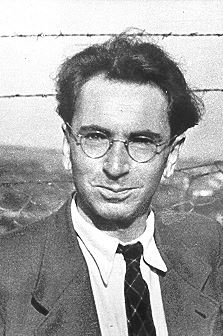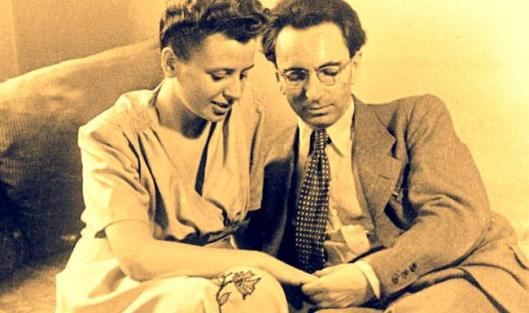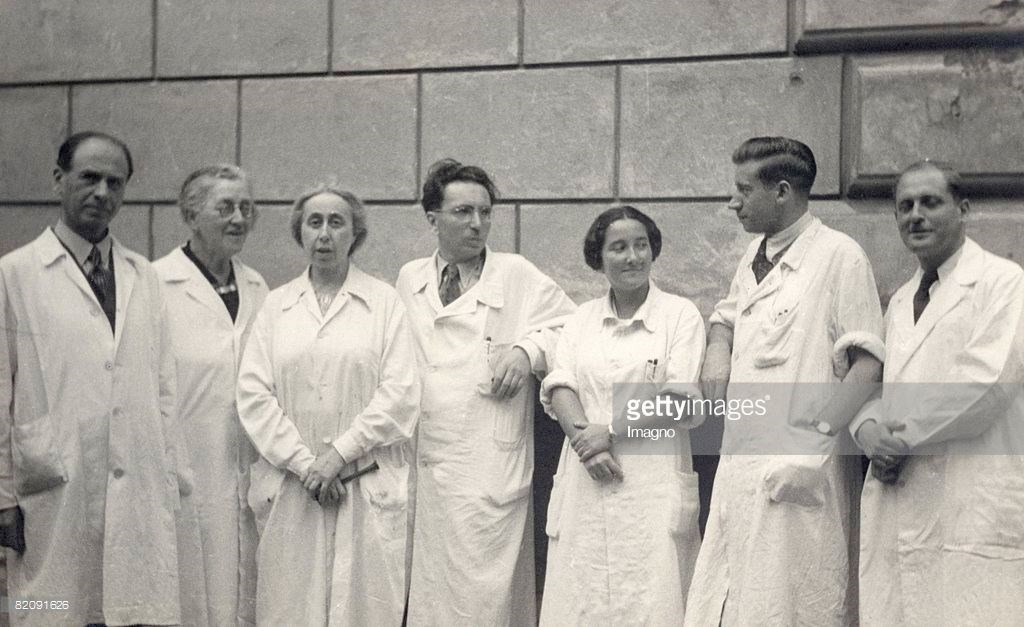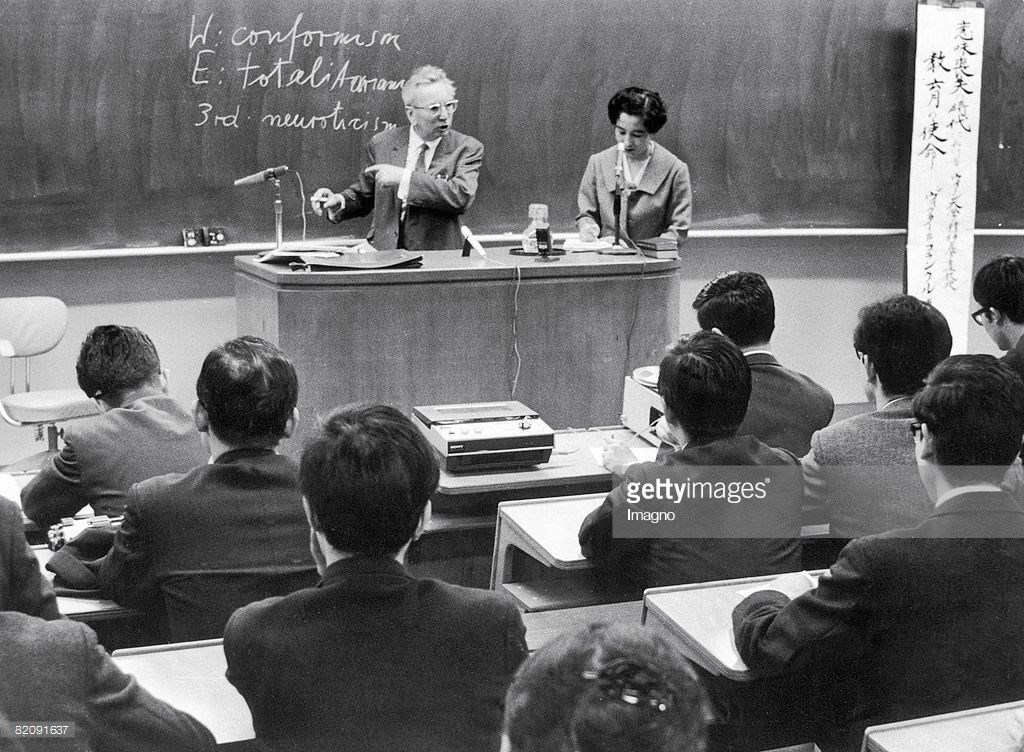 Frankl soon after the Holocausthttps://www.brainpickings.org/2014/03/26/viktor-frankl-presence-mans-search-for-meaning/
Frankl soon after the Holocausthttps://www.brainpickings.org/2014/03/26/viktor-frankl-presence-mans-search-for-meaning/
“Everything can be taken from a man but one thing: the last of the human freedoms—to choose one’s attitude in any given set of circumstances, to choose one’s own way” (Frankl 86). Even in the most testing of times, people still have the power to choose the way they act; these decisions are what make true heroes. Heroism is epitomized during times of struggle, especially when it is difficult to abide by one’s values. This fundamental truth of heroism is best portrayed in the article “Superheroes Rise in Tough Times” by Douglas Hyde: “More than 70 years ago, the very first superheroes debuted in the dire times of the Great Depression and the early years of World War II...‘We were just emerging from the Depression,’ Robinson recalls...Once the war came along, we felt a need for more patriotic heroes to fight Hitler,” (Hyde, Douglas). The article “Superheroes Rise in Tough Times” conveys a universal truth: people naturally look for a hero to trust and look up to in the most dire of times. Hence, a true hero is someone who remains morally intact and selfless, even during the most hopeless situations; a hero is not corrupted by bad experiences, but is instead elevated by them. These admirable figures in society put the welfare of others before their own, and help their community even if they do not receive compensation in return. As such, a hero cannot lose their desirable qualities when life takes a turn for the worst; a true hero will not abandon their values during these times, but will instead uphold them. In modern times, we see heroism in the likes of people such as whistleblowers and the women of the recent “Me Too” movement, who stick to their values even when it is difficult to do so. Even so, a hero does not necessarily have to be in a situation that forces them to act as such; they must, however, be moral throughout their lives. They are people who use their knowledge and positions to aid others to the best of their abilities and remain determined to overcome the worst of situations against all odds.
 Frankl and his wife Tilly, before the Holocausthttps://www.livedtheology.org/goethe-flight-lesson/Psychiatrist Viktor Emil Frankl was a prime example of someone who never lost sight of their morals, as he remained true to his altruistic values, even during the Holocaust. He made a huge positive impact on the world by using his traumatic past to his benefit. Despite having faced more tragedies than most men will in countless lifetimes, Frankl always remained altruistic, and never let his inner demons break him. Born to the devout Jewish couple of Gabriel Frankl and Elsa Lion Frankl on March 26, 1905, Frankl grew up in the Jewish district of Leopoldstadt in Vienna, Austria. Frankl was interested in the mind even as a child, and became a successful psychiatrist in his adult life. Unfortunately, right after he married his wife Tilly Grosser in 1941, the couple was forcefully shipped off to separate concentration camps, where Frankl suffered for many years. To add to Frankl’s strife, he was released to the devastating news that most of his family had died. This, however, did not stop him, for he wrote many acclaimed books and even created logotherapy, which helped patients overcome depression and find their “meaning of life.” Because of his great work, he was awarded the Oskar Pfister Prize in 1985 by the American Association of Psychiatrists. Viktor Frankl died on September 2, 1997, but his inspiring legacy lives on. A hero must possess selflessness and determination — they must be willing to sacrifice for other people and must also have the drive to continue in their path regardless of any obstacles they encounter on the way. Frankl embodied both selflessness and determination because he helped other people in every possible circumstance and overcame huge challenges, such as surviving the Holocaust. He dedicated his life to helping millions of people overcome their mental problems by selflessly disregarding his own wellbeing in order to assist the people of his community. Instead of being broken by his experiences at the Holocaust, he overcame them, and used them to educate other people; ultimately, Frankl’s selflessness and determination in the face of evil makes him a genuine hero.
Frankl and his wife Tilly, before the Holocausthttps://www.livedtheology.org/goethe-flight-lesson/Psychiatrist Viktor Emil Frankl was a prime example of someone who never lost sight of their morals, as he remained true to his altruistic values, even during the Holocaust. He made a huge positive impact on the world by using his traumatic past to his benefit. Despite having faced more tragedies than most men will in countless lifetimes, Frankl always remained altruistic, and never let his inner demons break him. Born to the devout Jewish couple of Gabriel Frankl and Elsa Lion Frankl on March 26, 1905, Frankl grew up in the Jewish district of Leopoldstadt in Vienna, Austria. Frankl was interested in the mind even as a child, and became a successful psychiatrist in his adult life. Unfortunately, right after he married his wife Tilly Grosser in 1941, the couple was forcefully shipped off to separate concentration camps, where Frankl suffered for many years. To add to Frankl’s strife, he was released to the devastating news that most of his family had died. This, however, did not stop him, for he wrote many acclaimed books and even created logotherapy, which helped patients overcome depression and find their “meaning of life.” Because of his great work, he was awarded the Oskar Pfister Prize in 1985 by the American Association of Psychiatrists. Viktor Frankl died on September 2, 1997, but his inspiring legacy lives on. A hero must possess selflessness and determination — they must be willing to sacrifice for other people and must also have the drive to continue in their path regardless of any obstacles they encounter on the way. Frankl embodied both selflessness and determination because he helped other people in every possible circumstance and overcame huge challenges, such as surviving the Holocaust. He dedicated his life to helping millions of people overcome their mental problems by selflessly disregarding his own wellbeing in order to assist the people of his community. Instead of being broken by his experiences at the Holocaust, he overcame them, and used them to educate other people; ultimately, Frankl’s selflessness and determination in the face of evil makes him a genuine hero.
Viktor Frankl used his profession to aid others with their personal mental conditions and struggles rather than to make money, making him truly selfless. Throughout his life, Frankl had always dedicated his time and knowledge to humanitarian efforts that benefit the community both before and after the Holocaust. Soon after the rise of Nazi Germany, the Jewish community in Vienna was under attack, and a prominent form of this occurred through the euthanization of Jewish citizens with mental disorders. Using the power he had as chief of neurology at the Rothschild hospital, Frankl readily risked his own life to save many mentally-ill Jews from Hitler’s euthanasia program:
 Frankl (middle) at the Rothschild hospitalhttps://www.gettyimages.co.uk/detail/news-photo/frankl-with-collegues-of-the-rothschild-hospital-from-left-news-photo/82091626#frankl-with-collegues-of-the-rothschild-hospital-from-left-to-right-picture-id82091626“...He was put in charge of the ward for suicidal women at the Psychiatric Hospital, with many thousands of patients each year…One year later, Hitler’s troops invade Austria. He obtained a visa to the U.S. in 1939, but, concerned for his elderly parents, he let it expire. In 1940, Frankl was made head of the neurological department of Rothschild Hospital, the only hospital for Jews in Vienna...He made many false diagnoses of his patients in order to circumvent the new policies requiring euthanasia of the mentally ill.” (Boeree, C. George).
Frankl (middle) at the Rothschild hospitalhttps://www.gettyimages.co.uk/detail/news-photo/frankl-with-collegues-of-the-rothschild-hospital-from-left-news-photo/82091626#frankl-with-collegues-of-the-rothschild-hospital-from-left-to-right-picture-id82091626“...He was put in charge of the ward for suicidal women at the Psychiatric Hospital, with many thousands of patients each year…One year later, Hitler’s troops invade Austria. He obtained a visa to the U.S. in 1939, but, concerned for his elderly parents, he let it expire. In 1940, Frankl was made head of the neurological department of Rothschild Hospital, the only hospital for Jews in Vienna...He made many false diagnoses of his patients in order to circumvent the new policies requiring euthanasia of the mentally ill.” (Boeree, C. George).
Frankl could have escaped the wrath of the Nazis very early on, but he decided to stay just to aid his parents, which shows how he put himself in immediate danger in order to help his family. His staying in Vienna was proved beneficial to the numerous mentally ill Jews he saved from Hitler’s euthanasia program by making “false diagnoses of his patients.” Despite putting himself in even greater danger, Frankl corrupted documents to save others from an unjust death proving his selflessness seldom falters even in the deadliest situations. The risk of punishment or death did not faze Frankl, however, as he continued to use his profession to help others and to stand up for the Jewish community, thus refusing to cower in the face of Nazi adversity. He used his psychiatric knowledge to help many people survive in the face of a towering menace, despite any danger he may encounter because of it. Frankl not only used his prowess in the medical field before the Holocaust but also used it during his time in the concentration camps as well:
“...the chief doctor...asked me to volunteer for medical duties in another camp containing typhus patients. Against the urgent advice of my friends...I decided to volunteer. I knew that in a working party I would die...but if I had to die there might at least be some sense in my death. I thought that it would doubtless be more to the purpose to try and help my comrades as a doctor than to vegetate or finally lose my life as the unproductive laborer that I was then” (Frankl 49).
Despite constantly fighting for his life while in the concentration camps, he still risked everything by volunteering to help treat his fellow prisoners regardless of “the urgent advice of [his] friends”, illustrating his unshakable selflessness. Frankl knew that his life was at stake in this scenario, and it would have been a far easier decision to leave those prisoners untreated, which in turn would have protected him from any disease. Frankl, however, went in ready to die, simply because he knew that he could use his knowledge in medicine to help sick prisoners, and he had valued helping others over anything else, believing his own life to be meaningless if it did not benefit everyone else. He remained glued to his values through all of the wretched experiences he had to fight through, and never let the enemy break his spirit or his good nature. Frankl remained altruistic throughout his entire life, even when it was exceedingly difficult to do so. In light of injustice and evil, Frankl could be seen as a hero because of his unfaltering selflessness and dedication to helping his community, no matter what it took to do so.
Despite the unspeakable torture and pain that Frankl was subjected to throughout his life, he never let that stop him from changing the world for the better; Frankl’s books and Logotherapy have allowed him to live on, and still help millions of people today. Even when Frankl was on the brink of death in a concentration camp, he never gave up on his work, and instead used it to help him survive, highlighting his resolve:
“Besides Theresienstadt and Auschwitz, Frankl spent time at the Kaufering III camp and at Türkheim, where he nearly died of typhus. Frankl had lost his manuscript at Auschwitz when he was forced to strip from his clothing. To stay alive in his darkest hours struggling with typhus, he kept himself going by scribbling what he could recall of his book on scraps of paper he had found.” (“Viktor Frankl”).
All hope seemed to be lost when Frankl was in a concentration camp and suffering from typhus, but he exhibited his noteworthy determination, as he still refused to give up on his life’s work. Instead, he used it to help him get by in the darkest of times, as he knew that he had to spread his message to the public. Frankl was only able to get through the Holocaust and publish his books because of his determination and unwillingness to surrender to his pain, and these qualities are what allowed him to be an inspiration and a hero. Despite Frankl’s immense suffering, he never gave up on fighting for his life or on his message, proving his unwavering determination. Soon after Frankl’s release from the concentration camps, he wrote his most famous and positively influential book, Man’s Search for Meaning. Frankl was determined to write a book which would help and inspire the greatest amount of people possible, and he did everything he could to make sure that this goal would be achieved. This steadfast determination of truth is amply illustrated, when Frankl used his real name and did not censor any passages despite the pain it caused him: “I had intended to write this book anonymously, using my prison number only. But when the manuscript was completed, I saw that as an anonymous publication it would lose half its value, and that I must have the courage to state my convictions openly. I therefore refrained from deleting any of the passages, in spite of an intense dislike of exhibitionism” (Frankl 6-7). Frankl’s determination is proved in the fact that he re-lived the horrifying experiences that he went through in the Holocaust and even attached his name to the book, despite his disinclination to do so. Frankl fought a multitude of mental battles to spread a message that would reach and help the vast majority of people. A true hero must have determination in order to successfully help as many people as possible, and Frankl exemplifies this quality; he was only able to help as many people as he did through hard work and tenacity, as he not only had to fight through the Holocaust, but also had to overcome the traumatic experiences of his past.
 Frankl giving a lecture in Tokyo https://www.gettyimages.co.uk/detail/news-photo/viktor-frankl-at-a-lecture-in-tokyo-japan-photograph-1969-news-photo/82091637#/viktor-frankl-at-a-lecture-in-tokyo-japan-photograph-1969-viktor-bei-picture-id82091637Frankl never gave up on himself or others, even in the lowest points of his life. He fought through these times and went on to use the lessons he learned to further his work and helped millions of people around the world, making him an admirable hero that others can learn from. A true hero never loses sight of what is right and what is wrong, even in the face of the most powerful adversity. A hero will stick to these values, no matter what the situation, and will always use their knowledge and position to help other people rather than just helping themselves. These values are exhibited best by Viktor Frankl, who was not only a righteous person throughout his life but also did not act differently during the Holocaust where he was always subject to torture and punishment. Frankl possessed two key traits that are necessary in all heroes; selflessness and determination. He placed the health of others’ before his own, giving up an insurmountable amount for strangers on several occasions. Frankl’s determination is what allowed him to persevere through horrific events like the Holocaust and still produce vastly influential work afterwards. Viktor Frankl inspires others to never give up on their aspirations in life no matter what obstacle they are met with and to always use their strengths for good. “Even in his nineties Frankl continued to engage in dialogue with visitors from all over the world and to respond personally to some of the hundreds of letters he received every week. Twenty-nine universities awarded him honorary degrees, and the American Psychiatric Association honored him with the Oskar Pfister Award. Frankl is credited with establishing logotherapy as a psychiatric technique that uses existential analysis to help patients resolve their emotional conflicts” (Frankl 163). Frankl suffered things that most people can only imagine, and yet his life is an astonishing success story. He produced influential work that is still relevant today, despite the odds being against him. Frankl’s life alone inspires people to succeed in life, in spite of any detriments in their path.
Frankl giving a lecture in Tokyo https://www.gettyimages.co.uk/detail/news-photo/viktor-frankl-at-a-lecture-in-tokyo-japan-photograph-1969-news-photo/82091637#/viktor-frankl-at-a-lecture-in-tokyo-japan-photograph-1969-viktor-bei-picture-id82091637Frankl never gave up on himself or others, even in the lowest points of his life. He fought through these times and went on to use the lessons he learned to further his work and helped millions of people around the world, making him an admirable hero that others can learn from. A true hero never loses sight of what is right and what is wrong, even in the face of the most powerful adversity. A hero will stick to these values, no matter what the situation, and will always use their knowledge and position to help other people rather than just helping themselves. These values are exhibited best by Viktor Frankl, who was not only a righteous person throughout his life but also did not act differently during the Holocaust where he was always subject to torture and punishment. Frankl possessed two key traits that are necessary in all heroes; selflessness and determination. He placed the health of others’ before his own, giving up an insurmountable amount for strangers on several occasions. Frankl’s determination is what allowed him to persevere through horrific events like the Holocaust and still produce vastly influential work afterwards. Viktor Frankl inspires others to never give up on their aspirations in life no matter what obstacle they are met with and to always use their strengths for good. “Even in his nineties Frankl continued to engage in dialogue with visitors from all over the world and to respond personally to some of the hundreds of letters he received every week. Twenty-nine universities awarded him honorary degrees, and the American Psychiatric Association honored him with the Oskar Pfister Award. Frankl is credited with establishing logotherapy as a psychiatric technique that uses existential analysis to help patients resolve their emotional conflicts” (Frankl 163). Frankl suffered things that most people can only imagine, and yet his life is an astonishing success story. He produced influential work that is still relevant today, despite the odds being against him. Frankl’s life alone inspires people to succeed in life, in spite of any detriments in their path.
I am inspired by Frankl every day, as his life motivates me to never give up on goals I set for myself; if Frankl was able to accomplish so much with far more difficult challenges, I know that I can as well. Frankl inspires me to persevere through every my hardships and to never lose sight of my values, even when it is hard to keep them. Motivated by Frankl’s life, I remain with my values, even when no-one is watching. I now stand up for what I believe in by drawing strength from Frankl’s legacy. For example, I have come to love the speech and debate at my school. In debate club, I have to argue against much more proficient speakers head on. Before, I would simply give up the minute I faced a difficult opponent, but after what I learned from Frankl’s legacy I seldom lose faith in my own words, and have confidence in what I argue for. I realize that if I quit in the face of adversity, I can never accomplish anything great in life. Frankl’s life has helped me come to the realization that there will be far more daunting challenges in the future, so I must persevere through the ones I have now to succeed in the future. Through his life, Viktor Frankl never let his past defeat him-he overcame it and used it to spread his knowledge to millions of people around the world. However, Frankl was not a hero because of his accomplishments; he was a hero because of his character. A real hero is defined during instances when being selfless or courageous is not convenient for them, but they remain as such. These situations are what exemplify one’s character. During times like these, Frankl stood up for his values by helping his fellow prisoners and never cowering to his captors. Above all else, Frankl will be remembered as a hero for his undying love and embodiment of the ideal human spirit. There are numerous teachings that people can learn from Frankl’s astounding life, even today. Frankl teaches us that one does not have to be physically strong to be a hero, as is depicted in most common stereotypes, but rather must be mentally strong. If one does not abandon their values, even when it is far more painless to do so, they are already on the first step to attaining the title of “hero”. Thus, the lessons about heroism one can learn from Frankl are not contained in his professional work, but are rather rooted in his commendable character
Works Cited
Boeree, C. George. “Viktor Frankl.” Viktor Frankl, webspace.ship.edu/cgboer/frankl.html.
Frankl, Viktor E. Man's Search for Meaning. Washington Square Press/Pocket Books, 1985.
Hyde, Douglas. “Superheroes Rise in Tough Times.” CNN, Cable News Network,
www.cnn.com/2009/SHOWBIZ/books/03/18/superhero.history/index.html.
"Viktor E. Frankl." People of the Holocaust, Gale, 1998. Biography In Context,
https://link.galegroup.com/apps/doc/K2422000019/BIC?u=powa9245&sid=BIC&xid=24911244. Accessed 14 Apr. 2018.
"Viktor Frankl." Encyclopedia of World Biography, vol. 37, Gale, 2017. Student Resources In
Context,https://link.galegroup.com/apps/doc/K1631010613/SUIC?u=powa9245&sid=SUI
C&xid=de902658. Accessed 5 Apr. 2018.
Page created on 5/29/2018 4:49:57 AM
Last edited 5/31/2018 5:52:01 PM
